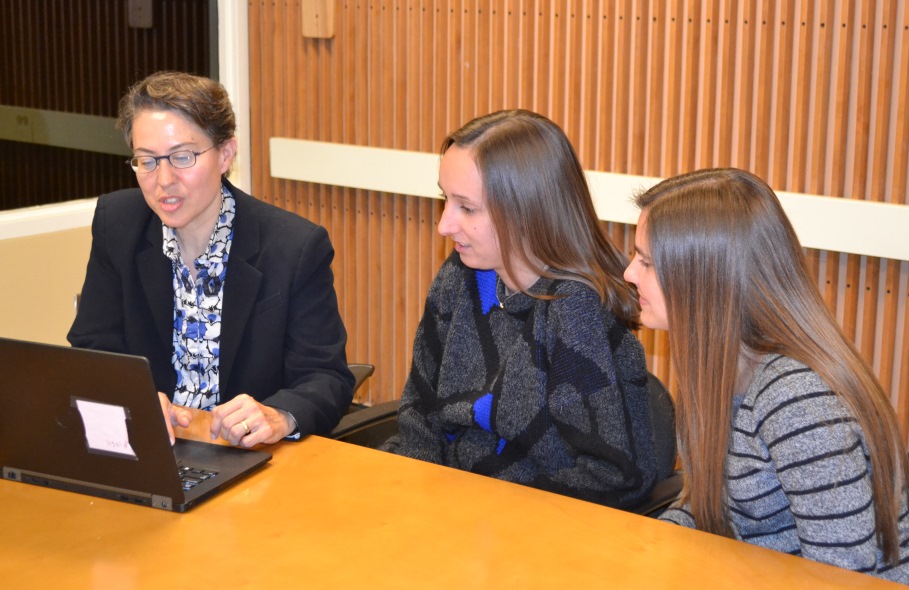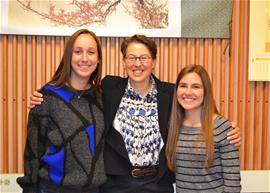James Scholar undergrads and faculty benefit mutually through research and learning
by Jennifer Marnul / Dec 1, 2016

James Scholar undergraduate students are known for their hard work, leadership abilities, and scholarly contributions in conducting, analyzing, and presenting their own research at the College of Education.
Jennifer Cromley, an associate professor in the Department of Educational Psychology, has worked with several James Scholar Honors students during her research on middle school students’ problem-solving in math and science. She provides experience and guidance for the students as they assist with analyzing data.
“We know our James Scholars are conscientious and hardworking,” Cromley said. “We benefit from the students’ work in getting the various research tasks accomplished, and they learn new skills such as coding, transcribing, and developing their Excel skills.”
The James Scholar Honors Program is a universitywide program that encourages undergraduate research and independent study. This often involves opportunities to work with faculty members who conduct research, giving students a closer connection to renowned educators.
And Cromley said the benefits are mutual. She has worked with honors students at various universities and chose to collaborate with James Scholars at the College because of their recognized industriousness.
 Cromley is currently working with two James Scholars on a project that analyzes sketches children make while solving math and science problems. According to data from the research, there were 299 sets of sketches to which the researchers applied 10,219 different codes (categorizing parts of the sketches).
Cromley is currently working with two James Scholars on a project that analyzes sketches children make while solving math and science problems. According to data from the research, there were 299 sets of sketches to which the researchers applied 10,219 different codes (categorizing parts of the sketches).
Cromley said conducting such research teaches students how to analyze data and learn systematic ways of research, a habit that can then be applied to teaching. This approach includes using observations of the way a student thinks and learns, and what assignments are best for a class.
“In research you have to be very systematic, and I think that’s a mindset that is useful when you’re teaching,” Cromley said. “You need to be systematic in how you explain things, grade assignments, and how you give feedback. With this project that they’ve been working on, it’s particularly suitable because you get to look into students’ minds and see how they’re putting pieces of information together and what kind of mistakes they’re making.”
James Scholars Rachel Granzin (a senior) and Rachel Bentivenga (a junior) said that working with research data gives them insights on how they might someday choose to run their own classrooms as future educators. Both are getting hands-on opportunities to discover real-world elements mixed with applicable research.
Granzin and Bentivenga believe the research they are assisting with will have a positive effect on their teaching careers. The project with Cromley has shown Bentivenga how fascinating it is to step back and think about how children comprehend and communicate certain things.
“Students may know the answer to a problem,” she said, “but they don’t want to share it. It’s nice to see the ways that you can get them to share what they know.”
Granzin, who used the skills Cromley gave her to complete inquiry projects while studying abroad, applied the sketching method in a seventh-grade math class and a kindergarten class. She said although the students can’t write yet, they can express themselves through drawings.
“It’s not really even math,” Granzin said. “It's just drawing a picture and writing a sentence about what it is, but still it relates.”
Bentivenga said it was beneficial during the research to observe the different ways children comprehended learning elements through drawing.
“You can see if, for example, they’re learning about the eye, when they have a lot of pictures of the eye. All the images may be correct, but they may label and interpret things differently. Certain things may stand out to a student and for another they won’t even notice it,” she said.
The James Scholar program also provides students access to faculty presentations and has benefited them in other areas such as study abroad trips. Bentivenga said she enjoys the faculty talks and learning about the research that many different Illinois professors are conducting.
“Going to a talk allows you to hear them explain how they implemented that research and how they were a teacher and they realized certain things and went on to do the research,” Bentivenga said. “It’s great to see these things that are going on at the U of I.”